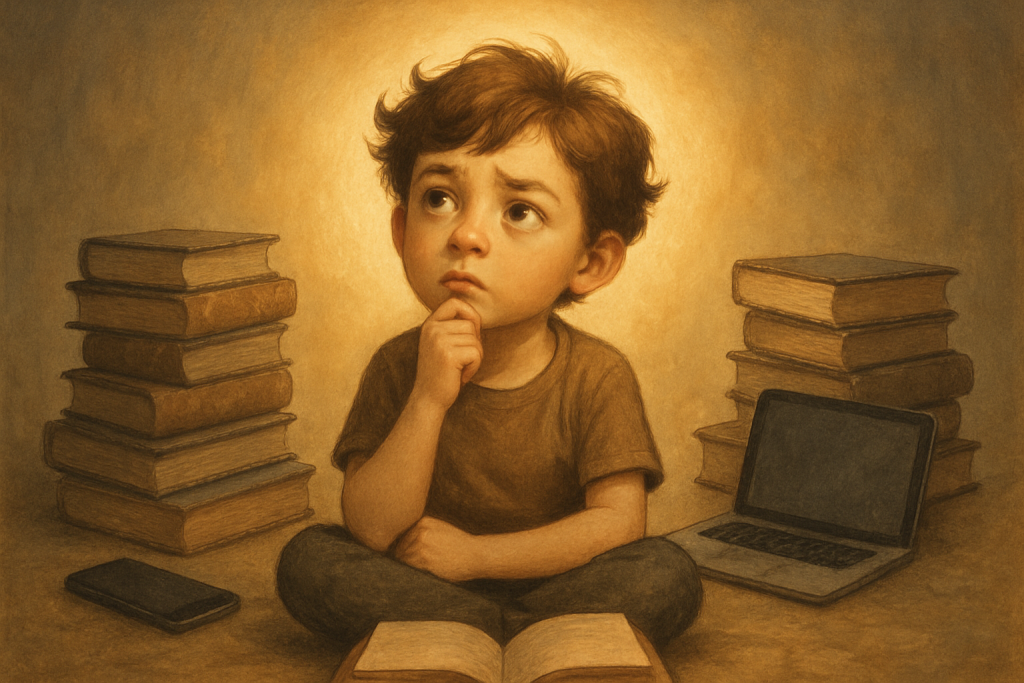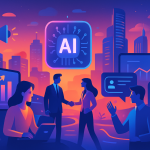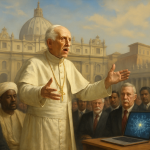The year is 2025. Flying cars are still stuck in development hell (thanks, Elon!), but artificial intelligence is woven into the very fabric of our lives. It’s helping us write articles (ironic, right?), diagnose diseases, and even choose what to binge-watch next. But amidst this AI-powered utopia, a voice of caution has emerged from an unexpected corner: the Vatican.
Pope Leo XIV, elected just last month, has thrown down the gauntlet, expressing serious concerns about the potential negative effects of AI on the intellectual, neurological, and spiritual development of children. In a message delivered to a Vatican-hosted conference on AI and ethics, the pontiff didn’t mince words, emphasizing the urgent need for AI development to adhere to ethical standards that protect human dignity and respect global diversity. It’s a move that echoes the Church’s long history of grappling with technological advancements, a history that stretches back to the printing press and beyond.
Think of it as the Catholic Church’s version of the Turing Test, only instead of determining if a machine can *think*, it’s asking if a machine is helping us *think* better, or simply replacing the need to think at all. The Pope’s concerns zero in on the vulnerability of youth in this new AI landscape. He argued that children’s unprecedented access to vast amounts of data could be mistakenly perceived as true intelligence. It’s like confusing a library card for a PhD, or believing you’re a master chef because you can perfectly follow a recipe from an AI-powered cooking app. The real magic, the Pope suggests, lies in nurturing authentic wisdom and the God-given talents of each child, rather than equating mere data access with genuine understanding.
“All of us, I am sure, are concerned for children and young people, and the possible consequences of the use of AI on their intellectual and neurological development,” the Pope stated, a sentiment that resonates far beyond the Vatican walls. He further emphasized that society’s well-being hinges on enabling young people to develop their inherent gifts and capabilities, rather than letting them confuse access to data with intelligence. It’s a call for a more human-centered approach to AI, one that prioritizes critical thinking, creativity, and spiritual growth over rote memorization and algorithmic efficiency. Are we creating a generation of data regurgitators, or are we fostering the next generation of innovators and problem-solvers? That’s the question the Pope seems to be asking.
This isn’t just some random papal musing. Pope Leo XIV has made addressing the societal implications of AI a top priority since his election. He sees himself as following in the footsteps of Pope Leo XIII, who famously advocated for workers’ rights during the Industrial Revolution. It’s a powerful analogy, suggesting that we’re on the cusp of another major societal upheaval driven by technology, and that the Church has a moral obligation to guide humanity through it. Think of it as a spiritual version of the Hippocratic Oath: first, do no harm, even to your neural pathways.
This latest address builds upon the Vatican’s growing engagement with AI ethics, a trend that started under the late Pope Francis, who called for human oversight in AI applications and advocated for international treaties to regulate the technology. The Church, it seems, is determined to be a key player in shaping the future of AI, ensuring that it serves humanity’s best interests rather than becoming its master.
So, what are the potential implications of the Pope’s message? Well, for starters, it could fuel the already heated debate about AI regulation. Expect to see more calls for ethical guidelines, safety standards, and perhaps even international treaties governing the development and deployment of AI. Companies developing AI-powered educational tools, in particular, will likely face increased scrutiny. Parents, educators, and policymakers will be asking tough questions about the impact of these tools on children’s cognitive development and overall well-being. Are we sacrificing deep learning for shallow convenience? Are we trading critical thinking for algorithmic suggestions? These are the questions that will need answering.
Beyond the immediate policy implications, the Pope’s message raises deeper philosophical questions about the nature of intelligence, knowledge, and wisdom. In an age where AI can generate text, create art, and even compose music, what does it mean to be human? What distinguishes us from machines? The Pope seems to be suggesting that it’s not just about processing information, but about cultivating virtues, developing empathy, and connecting with something larger than ourselves. It’s about the soul, not just the silicon.
And let’s not forget the financial angle. The AI industry is a multi-billion dollar behemoth, and any significant shift in public perception or regulatory policy could have major economic consequences. If the Pope’s message resonates with a large segment of the population, it could lead to increased consumer skepticism towards AI-powered products and services, potentially impacting the bottom lines of tech companies. It could also spur investment in AI ethics research and the development of more human-centered AI technologies. Think of it as a moral tax on reckless innovation, a reminder that progress should serve people, not the other way around.
Ultimately, Pope Leo XIV’s message is a call for a more thoughtful and ethical approach to AI development, one that prioritizes human dignity and the well-being of future generations. It’s a reminder that technology is a tool, not a master, and that we have a responsibility to use it wisely. As Uncle Ben (of Spiderman fame) once said, “With great power comes great responsibility.” And in the age of AI, that responsibility falls on all of us, from the tech titans in Silicon Valley to the parents tucking their children into bed at night. The future of humanity may depend on it.
Discover more from Just Buzz
Subscribe to get the latest posts sent to your email.


